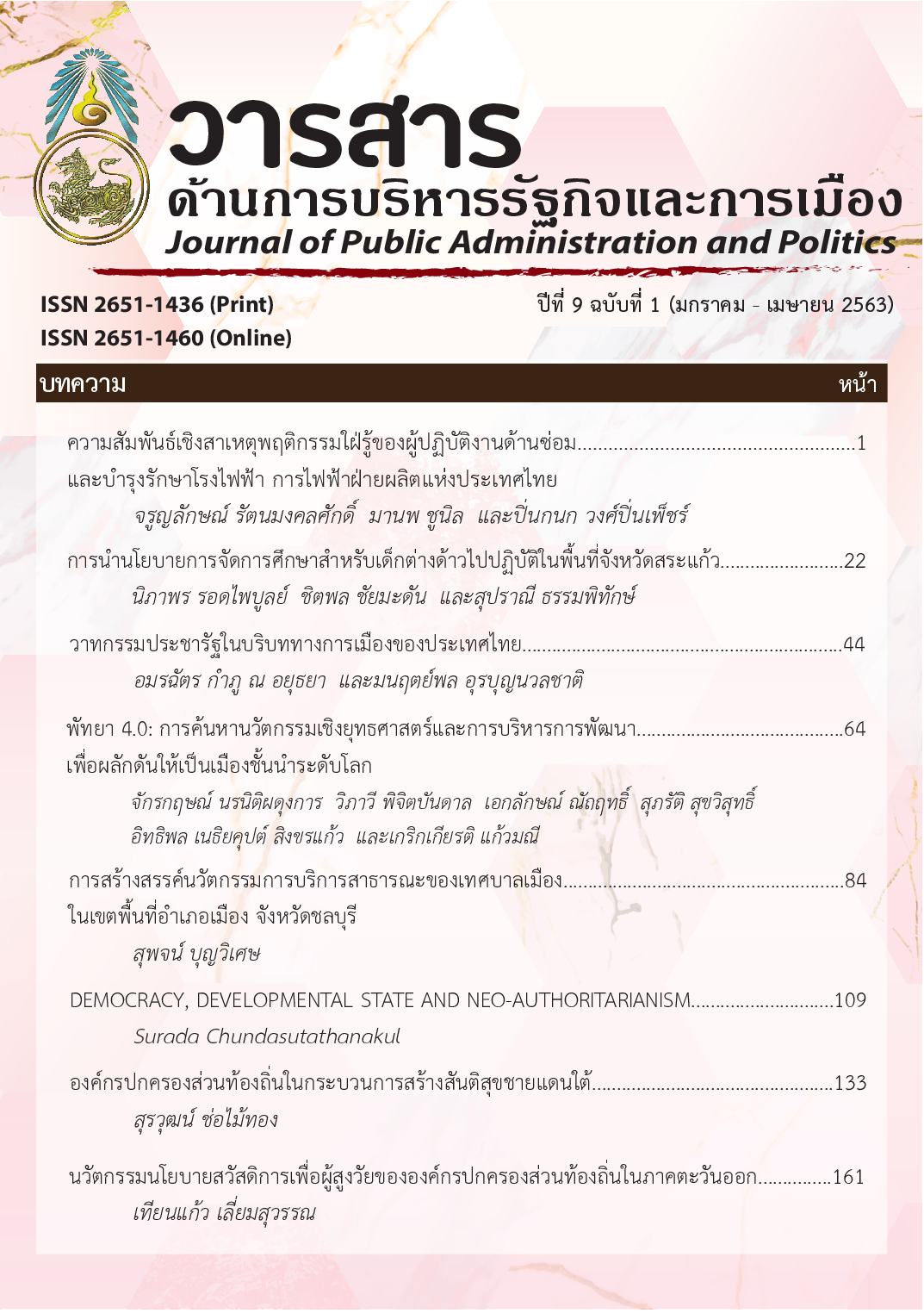DEMOCRACY, DEVELOPMENTAL STATE AND NEO-AUTHORITARIANISM
Main Article Content
บทคัดย่อ
บทความนี้ต้องการศึกษาทฤษฎีประชาธิปไตย รัฐพัฒนาการ และอำนาจนิยมใหม่เนื่องจากหลายประเทศได้เข้าสู่ภาวการณ์เป็นรัฐพัฒนาการอำนาจนิยมใหม่โดยที่ไม่จำเป็นจะต้องเป็นรัฐอำนาจนิยม ดังนั้น ผู้เขียนต้องการทำความเข้าใจว่ารัฐสามารถใช้การพัฒนาและการเติบโตทางเศรษฐกิจมาเป็นข้ออ้างในการควบคุมตลาดได้อย่างไร และผู้เขียนได้ใช้วิธีทบทวยวรรณกรรมและศึกษาเอกสารต่าง ๆ ในการเขียนบทความนี้และได้ข้อสรุปว่าประชาธิปไตยไม่ใช่สิ่งที่จำเป็นเมื่อเป็นเรื่องการพัฒนาทางเศรษฐกิจ และในทางตรงกันข้าม หากประเทศใช้การบริหารตามแนวคิดอำนาจนิยมจะสามารถพัฒนาระบบเศรษฐกิจได้มีประสิทธิภาพมากกว่าเพราะเป็นการสั่งการผ่านโครงสร้างการบังคับบัญชา
แนวคิดรัฐพัฒนาการ หรือรัฐที่กระทำการพัฒนาเริ่มใช้ครั้งแรกในการอธิบายสภาวการณ์ที่รัฐเข้ามาแทรกแซงกลไกตลาดในประเทศญี่ปุ่น ในช่วงปี ค.ศ. 1980-1990 โดยชาร์เมอร์ จอห์นสัน ซึ่งญี่ปุ่นถือว่าเป็นต้นแบบการพัฒนาทางเศรษฐกิจให้กับ
ประเทศกำลังพัฒนาหลายประเทศในภูมิภาคเอเชีย ซึ่งในหลายครั้งการใช้แนวคิดรัฐพัฒนาการจะใช้ควบคุมไปกับนโยบายแบบชาตินิยมเพื่อให้การพัฒนาเศรษฐกิจและการเมืองไปในทิศทางเดียวกัน รวมถึงเป็นการสร้างกรอบวัฒนธรรมให้คนในชาติว่ารัฐนั้นเป็นรัฐแห่งชาติและจะดำเนินงานเพื่อชาติ และในบางกรณีรัฐจะต้องทำให้กลไกราคาบิดเบือนหากจะเป็นไปเพื่อประโยชน์ของอุตสาหกรรมหลักที่เป็นเป้าหมายในการพัฒนาของชาติ ซึ่งเป็นวิธีการที่ตรงกันข้ามกับแนวความคิดเศรษฐศาสตร์คลาสสิคใหม่ที่รัฐต้องทำให้กลไกราคาถูกต้องเสมอ นอกจากประเทศญี่ปุ่นแล้วยังมีประเทศเกาหลีและไต้หวันที่เป็นแบบอย่างประเทศรัฐพัฒนาการ แต่ไต้หวันถูกวางอยู่ในประเภทรัฐพัฒนาการใหม่เนื่องจากใช้การผลิตเพื่อทดแทนการนำเข้าและการวางนโยบายเศรษฐกิจเพื่อสนับสนุนภาคเอกชน อย่างไรก็ตามในยุคโลกาภิวัตน์การวางนโยบายทางเศรษฐกิจของประเทศจะไม่สามารถทำได้โดยอิสระเพราะมีองค์การระหว่างประเทศเข้ามาร่วมควบคุม ทำให้ประเทศรัฐพัฒนาการต้องปรับนโยบายให้สอดรับกับโลกาภิวัตน์
แนวคิดรัฐพัฒนาการอำนาจนิยมใหม่ในกลุ่มประเทศเอเชียตะวันออกเฉียงใต้และเอเชียเริ่มก่อตัวขึ้นจากการวางนโยบายเศรษฐกิจของสิงคโปร์และจีนที่รัฐบาลเป็นผู้นำนโยบายเศรษฐกิจและลดความสำคัญของประชาธิปไตยลง และให้ความสำคัญกับการเมืองในฐานะเป็นแรงผลักดันหลักให้รัฐดำเนินนโยบายเศรษฐกิจแบบรัฐพัฒนาการอำนาจนิยมใหม่ได้มีประสิทธิภาพมากขึ้น อีกทั้งจีนยังเป็นตัวอย่างประเทศที่มีพัฒนการทางเศรษฐกิจอย่างต่อเนื่องทั้ง ๆ ที่ไม่ใช่ประเทศเสรีนิยมประชาธิปไตย บทความนี้จึงเป็นการคลี่แนวคิดรัฐพัฒนาการและอำนาจนิยมใหม่ให้ผู้อ่านได้เห็นความสัมพันธ์ของสองแนวคิดนี้มากขึ้น
Article Details
เอกสารอ้างอิง
- Amsden, A. H. (1989). Asia's next giant: South Korea and late industrialization. Oxford: Oxford University Press.
- Amsden, A. H. and Chu, W. (2003). Beyond late development: Taiwan's upgrading policies. Cambridge: MIT Press.
- Arnstein, S. R. (1969). A ladder of citizen participation. Journal of the American Institute of Planners, 35(4), pp.216-224.
- Barber, B. R. (2003). Strong democracy: Participatory politics for a new age. Berkeley: University of California Press.
- Carothers, T. (2002). The end of the transition paradigm. Journal of Democracy, 13(1), pp.5-21. Retrieved from www.journalofdemocracy.org/articles-files/gratis/Carothers-13-1.pdf
- Case, W. (2010). Contemporary authoritarianism in Southeast Asia: Structures, institutions and agency. London: Routledge.
- Cerny, P. G. (2008). Embedding neoliberalism: the evolution of a hegemonic paradigm. The Journal of International Trade and Diplomacy, 2(1), pp.1-46.
- Diamond, L. (1999). Developing democracy: Toward consolidation. London: The Johns Hopkis University Press.
- Hoffman, J and Graham, P. (2006). Introduction to political theory. Harlow, England: Longman Pearson Education.
- Huntington, S. P. (1968). Political order in changing societies. New Haven: Yale University Press.
- Huntington, S. P. (1991). The third wave: democratization in late twetieth century. Lodon: University of Oklahoma Press.
- Inoguchi, T., Newman, E., and Keane, J. (1998). The changing nature of democracy. Tokyo: The United Nations University.
- Leftwich, A. (2000). States of development: on the primacy of politics in development. Cambridge: Polity Press.
- Linz, J. J., and Stepan, A. (1996). Toward consolidated democracies. Journal of Democracy, 7(2), pp.14-33.
- Lippmann, W. (1922). Public opinion. New York: The Free Press.
- Lipset, S. M. (1959). Some social requisites of democracy: Economic development and political legitimacy. The American Political Science Review, 53(1), pp.69-105.
- Micklethwait, J., and Wooldridge, A. (2014). The fourth revolution: The global race to reinvent the state. London: Allen Lane.
- Nithi Nuangjamnong. (2009). The adaptation of developmental state: Case study of South Korea's trade liberalization policy after the 1997 financial crisis. Doctoral dissertation, Political Science, Faculty of Political Science, Chulalongkorn University. (in Thai).
- O’Donnell, G. (1994). Delegative democracy. Journal of Democracy, 5(1), pp.55-69.
- O’Donnell, G. (2004). Why rule of law matters. Journal of Democracy, 15(4), pp.32-46.
- O'Donnell, G. A. (1998). Horizontal accountability in new democracies. Journal of Democracy, 9(3), pp.112-126.
- Peruzzotti, E. and Smulovitz, C. (2008). Social accountability in Latin America. Journal of Democracy, 11(4), pp.147-158.
- Plattner, M. F. (2010). Populism, pluralism, and liberal democracy. Journal of Democracy, 21(1), pp.81-92.
- Pridham, G. (2000). The dynamics of democratization: A comparative approach. New York: Continuum.
- Rustow, D. A. (2009). Transition to democracy: Toward a dynamic model. In L. Mayer, D. Patterson, & F. Thames (Eds.), Contending Perspectives in Comparative Politics (pp.433-446). Washington, D.C.: CQ Press.
- Schedler, A. (2010). Authoritarianism’s last line of defense. Journal of Democracy, 21(1), pp.69-80.
- Snow, D. A., Rochford, E. B., Worden, S. K., and Benford, R. D. (1986, August). Framing alignment processes, micromobilization and movement participation. American Sociological Review, 51(4), pp.464-481. Retrieved from http://www.uni-leipzig.de/~sozio/mitarbeiter/m29/content/dokumente/595/SnowFrame1986.pdf
- Tilly, C. (2007). Democracy. Cambridge: Cambridge University Press.
- Watson, P. and Barber, B. (1988). The struggle for democracy. Toronto: Lester & Orpen Dennys.
- Wolin, S. S. (2008). Democracy incorporated: Managed democracy and the specter of inverted totalitarianism. New Jersey: Princeton University Press.
- Woo-Cuming, M. (Ed.). (1999). The developmental state. Ithaca: Cornell University Press.
- Zakaria, F. (1997). The rise of illiberal democracy. Foreign Affairs, 76(6), pp.22-43.


